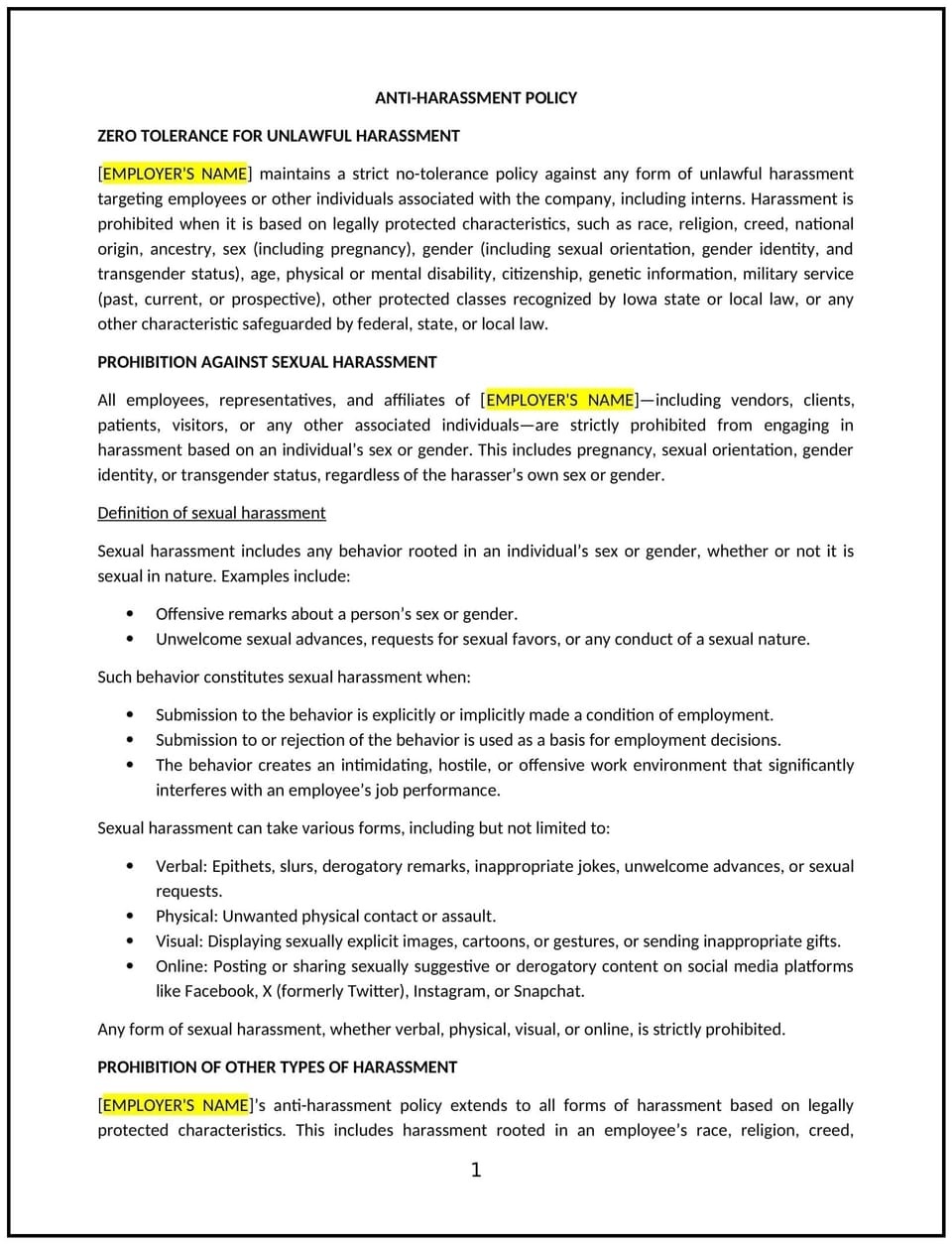Anti-harassment policy (Iowa): Free template

Anti-harassment policy (Iowa)
An anti-harassment policy helps Iowa businesses create a safe and professional workplace by outlining expectations for behavior and providing a framework for addressing harassment claims. This policy applies to all employees, managers, contractors, and business partners, ensuring that workplaces remain free from harassment based on race, gender, religion, disability, or other protected characteristics under Iowa law.
This policy provides guidance on identifying, reporting, and addressing harassment in the workplace. It encourages a respectful work environment and helps businesses manage risks related to workplace conflicts.
By implementing this policy, businesses in Iowa can promote professionalism, reduce workplace disputes, and foster a culture of respect and accountability.
How to use this anti-harassment policy (Iowa)
- Define harassment: Provide a clear definition of workplace harassment, including verbal, physical, visual, and digital misconduct.
- Establish reporting procedures: Outline how employees can report harassment, including anonymous reporting options.
- Identify responsible parties: Specify who is responsible for handling and investigating harassment claims.
- Set investigation protocols: Establish a fair and structured process for reviewing complaints and determining appropriate action.
- Prohibit retaliation: Emphasize that employees who report harassment in good faith are protected from retaliation.
- Communicate expectations: Ensure all employees understand acceptable workplace behavior and the consequences of policy violations.
- Provide training: Educate employees and managers on recognizing and preventing workplace harassment.
- Review and update: Regularly assess the policy to reflect changes in Iowa employment laws or workplace needs.
Benefits of using this anti-harassment policy (Iowa)
This policy offers several advantages for Iowa businesses:
- Promotes a professional work environment: Establishes clear behavioral expectations.
- Reduces legal and reputational risks: Helps businesses address and resolve harassment issues proactively.
- Enhances employee trust: Encourages a culture of respect and accountability.
- Improves retention and morale: Creates a workplace where employees feel safe and valued.
- Encourages early intervention: Provides structured reporting and resolution processes to handle issues before they escalate.
- Supports a fair workplace: Ensures all employees are treated with dignity and respect.
Tips for using this anti-harassment policy (Iowa)
- Train employees and managers: Businesses should provide harassment prevention training to all staff members.
- Establish clear reporting mechanisms: Businesses should create multiple reporting channels, including anonymous options.
- Maintain confidentiality: Businesses should handle harassment claims with discretion to protect all parties involved.
- Investigate promptly: Businesses should address reports quickly and fairly to prevent escalation.
- Enforce policy consistently: Businesses should apply disciplinary actions fairly and document all actions taken.
- Communicate regularly: Businesses should integrate anti-harassment messaging into workplace training and employee handbooks.
Q: Why should Iowa businesses implement an anti-harassment policy?
A: Businesses should implement this policy to promote a professional work environment, reduce conflicts, and address issues before they escalate.
Q: What types of behavior are considered workplace harassment?
A: Harassment includes unwelcome verbal, physical, visual, or digital conduct based on race, gender, religion, disability, or other protected characteristics.
Q: How can businesses encourage employees to report harassment?
A: Businesses should offer multiple reporting options, including anonymous reporting, and assure employees that retaliation is prohibited.
Q: What steps should businesses take when a harassment claim is filed?
A: Businesses should conduct a prompt and fair investigation, document findings, and take appropriate corrective action.
Q: How often should businesses review their anti-harassment policy?
A: Businesses should review and update the policy annually or as workplace needs and legal requirements change.
Q: Can small businesses in Iowa benefit from an anti-harassment policy?
A: Yes, businesses of all sizes should implement this policy to establish clear expectations and promote a safe work environment.
Q: What should businesses do if harassment occurs between employees and third parties?
A: Businesses should apply the policy consistently to all workplace interactions, including those involving clients, vendors, or contractors.
Q: How should businesses train employees on harassment prevention?
A: Businesses should provide regular training sessions, distribute policy updates, and encourage open discussions on respectful workplace behavior.
This article contains general legal information and does not contain legal advice. Cobrief is not a law firm or a substitute for an attorney or law firm. The law is complex and changes often. For legal advice, please ask a lawyer.


